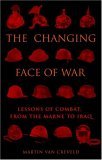Who was it who said “how can I know what I think until I say it?” Substitute “say” with “blog”.
I had a comment on my own post about Iran recently. I said something off the seat of my pants, which I have been mulling since then:
The United States has suffered at the hands of what are called Fourth Generation Warfare opponents for some time now. Iran presents us with the opportunity to wage 4GW ourselves. John Boyd said that war is fought on the moral, mental and physical planes, and that the physical is the least important and least decisive. The Mullah regime is morally and intellectually bankrupt. It needs to be attacked on that level. The end game is something like 1989, where there are no NATO troops on the street, but the Warsaw Pact evaporates. A strong background military threat is imperative.
Now, what I mostly see about 4GW is stuff from William Lind or his spiritual father Martin van Creveld, in which the nation state is basically doomed to lose to 4GW opponents, assisted by knowingly or foolishly complicit people in civil society who are duped and coopted by the 4GWarriors. John Robb seems to think the global guerrillas will get more and more powerful until our current political organization crumbles and is replaced by something networked and post-Westphalian. Thomas X. Hammes at the end of his book suggests at least the possibility of a 4GW type of military which could be networked and agile, but it is more of a sketch than a full-blown set of proposed reforms. Other writers suggest various sensible reforms the military might adopt — e.g. Donald Vandergriff, and sometimes Ralph Peters.
But what I want to know is this: Can the US military, with or without the engagement of other parts of the government, with our without the assistance of other countries, initiate, wage and win a 4GW campaign? More narrowly, what would a U.S.-led 4GW campaign against the Iranian mullah regime look like? or, rephrased, can the “soft kill” or the “non-kinetic kill” be a set of actual policies with a viable chance of success, rather than (potentially) a mere cover for inaction? And finally, whatever set of policies, strategies, tactics and tools are employed to do the non-kinetic kill against the Mullah regime, does the 4GW or 5GW terminology add anything of value? Does it lend clarity, cause confusion, or do nothing at all?
